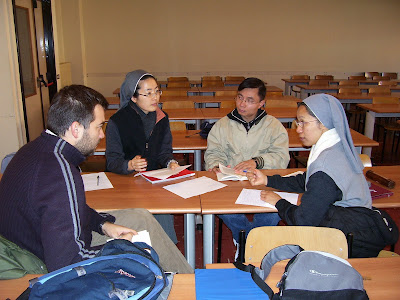Introduction to the Devout Life: Part Third
Several Counsels for the practice of Virtues
English-speaking Group and French-speaking Guest:
Justin Narzary, Grea Duzon Mendoza,
Sebhat Hadgu Kahsay, Umbi Didier Cabala
Chapters 1- 20.
“Charity never enters a heart without finding a lodging there for itself.” chapter 1
How can a water fills a glass if it is already filled or even overflowing with things un essential? We must be living containers ready to accept and welcome the daily graces that is outpouring of God’s abundant love present and evident in us and in one another. It is always a great challenge to live such humble emptiness in us, and provide the space for the real purpose of loving.
“Charity waters the soul and produces in it virtuous deeds, each in its proper season.” chapter 1
The good sower has a great patience in waiting for the growth of the seeds he had planted. The time would be his constant companion in his waiting while he does his part in making it sure they are protected and cared of and keeping at heart that living hope that abandons trustfully to the power beyond his control. In both process of growth (the seed and the sower) comes the great opportunity to learn something from waiting.
In the practice of virtues:
- we must prefer that of which corresponds with our duties and not with our taste.
- prefer the most excellent and not showy.
- choose a special practice of some particular virtue.
“The king of glory doesn’t reward his servants according to the dignity of their office but according to the love and humility with which they carry them out.” chapter 2
God doesn’t count our personal glories manifested in what we are good in doing and responsibilities and status yet, he looks lovingly at the heart that are capable of bending towards Him in recognition that it is done all for His glory.
Is it still relevant to live these virtues in our present world where the “values” of life had been corrupted and lived ‘differently’?
In this chapter, SFS had pointed out many great examples of saintly lives ‘that had been truly rewarded of such a foretaste of happiness that had made them long for its fullness in the real Paradise’ and presented practical virtues that are ‘humanly attainable’ . We are all called to a life of holiness, where our real joy is the certainty and in our journey to the Truth, we must exercise ourselves in these virtues, small it may, as our everyday realities are composed of such occasions where the remaining choice is not what is apparent and pleasing but what would bring us more closer to our God and fulfil the reasons of our life’s purpose, living His will.
Pastoral Application:
- To live our lives with much responsibility as we don’t put our values in compromise with the many choices that are seducing and unreal.
- To transmit by means of our visible testimony to others the joy and contentment of having that kind of treasure, worth of a thousand thing.
- Encourage and introduce them to such kind of values.
- “Love hold the first rank among the emotions of the soul. It is the king of all movements of the heart. It changes all the rest to itself and makes us what is loved.” chapter 17.
- “The more excellent the good things communicated, the more excellent will be the friendship.” chapter 17
- “Love everyone with a great love of charity but have friendship with those capable of communicating virtuous things to you.” chapter 19
Pastoral Reflection:
Among our youth of today, the attraction of the peer in influencing their choices and living their values and ways of relationship speaks more than that of the voice of the family as their point of reference. What kind of friendships do they have and belongs to? Infact, the fear of every parents is whether they are in good company or not. It is to be noted too, the kind of relationship that are being lived in every family, community and much more relating with the self, that reflects what kind of love that dwells and animates our hearts. But then, a great challenge lies also for those in pastoral care in educating and guiding them to a wholesome groups that are capable of relationships directed to the seriousness of rapport that are grounded on values and Christian teaching.
Text by Sr Grea Mendoza
Photo by Joe Boenzi: Discussing the Devout Life in English and French













